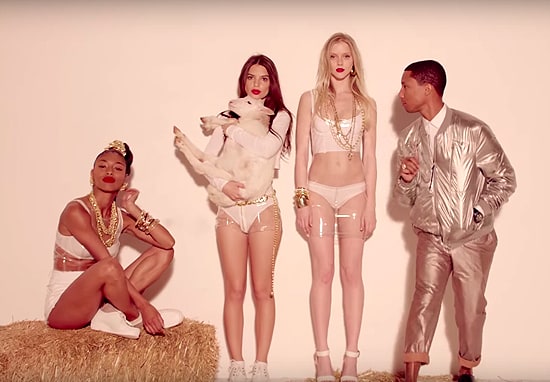 "Blurred Lines" screenshot.
YouTube
"Blurred Lines" screenshot.
YouTube
"Blurred Lines" was a song destined to date badly from the moment it was written. Though it was only released in 2013, Robin Thicke and Pharrell singing, "I know you want it, You're a good girl,Can't let it get past me" has sounded worse and worse with every play. Naturally, it was called out at the time and subseqently, after the rise of the Time's Up movement, it has been left in the cultural shadows.
Pharrell deals with the legacy of one of his biggest hits in an interview for the cover of GQ's New Masculinity issue, out today. He brings "Blurred Lines" up of his own accord when chatting about wearing clothes designed for women. He says he was "born in a different era" and recalls a time when everything from adverts to song lyrics were different. Moving on to his own material, Pharrell said: "Some of my old songs, I would never write or sing today. I get embarrassed by some of that stuff. It just took a lot of time and growth to get to that place.”
It was his mega-hit with Thicke, specifically the backlash to it, that led Pharrell to that point. “I think ‘Blurred Lines’ opened me up," he said. "I didn’t get it at first. Because there were older white women who, when that song came on, they would behave in some of the most surprising ways ever. And I would be like, ‘Wow.’ They would have me blushing. So when there started to be an issue with it, lyrically, I was, like, ‘What are you talking about?’ There are women who really like the song and connect to the energy that just gets you up. And I know you want it — women sing those kinds of lyrics all the time. So it’s like, What’s rapey about that?
And then I realized that there are men who use that same language when taking advantage of a woman, and it doesn’t matter that that’s not my behavior. Or the way I think about things. It just matters how it affects women. And I was like, ‘Got it. I get it. Cool.’ My mind opened up to what was actually being said in the song and how it could make someone feel. Even though it wasn’t the majority, it didn’t matter. I cared what they were feeling too. I realized that we live in a chauvinist culture in our country. Hadn’t realized that. Didn’t realize that some of my songs catered to that. So that blew my mind.”
You can read the full Pharrell interview on GQ now.
Listen to The FADER's weekly playlist of songs you need in your life


